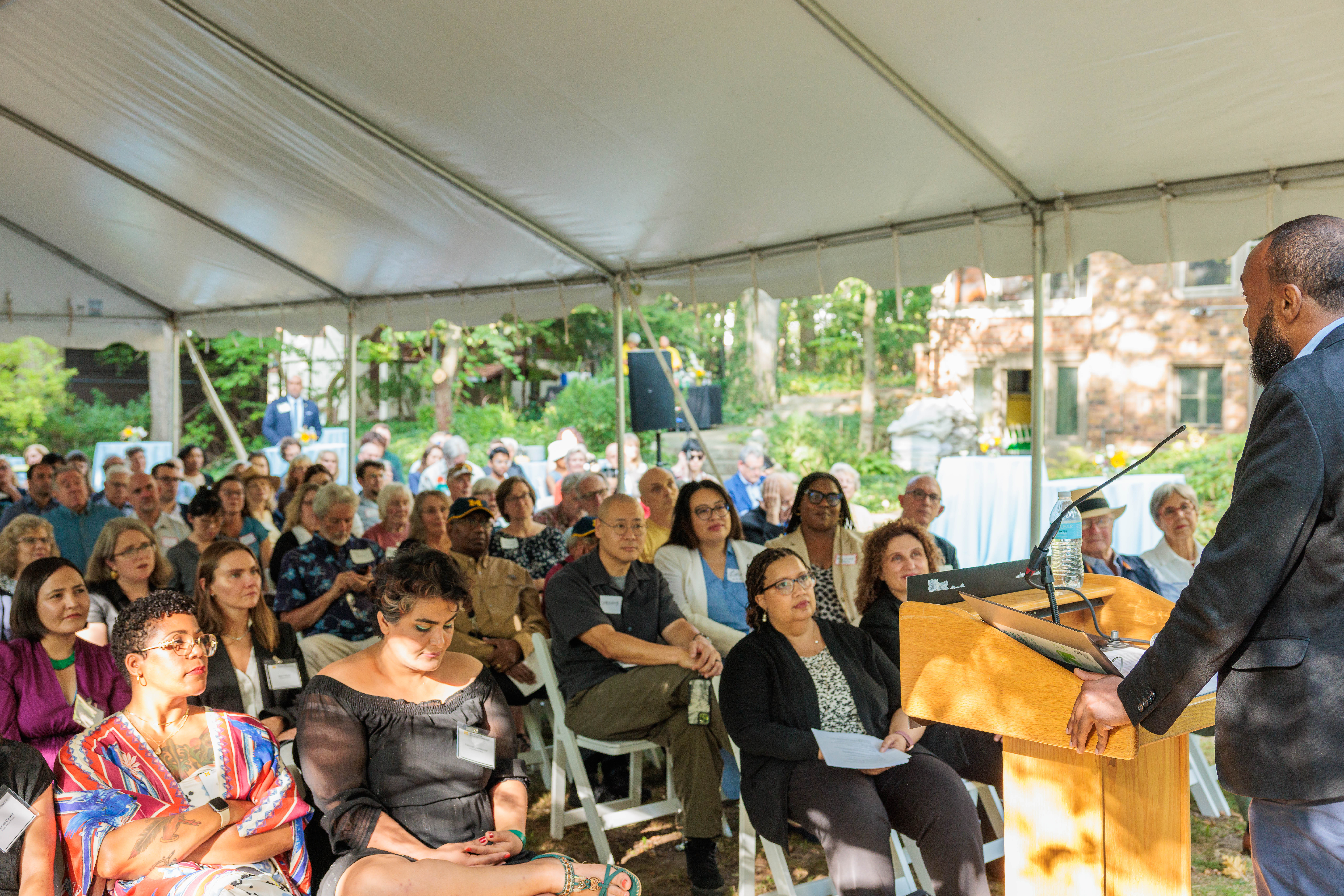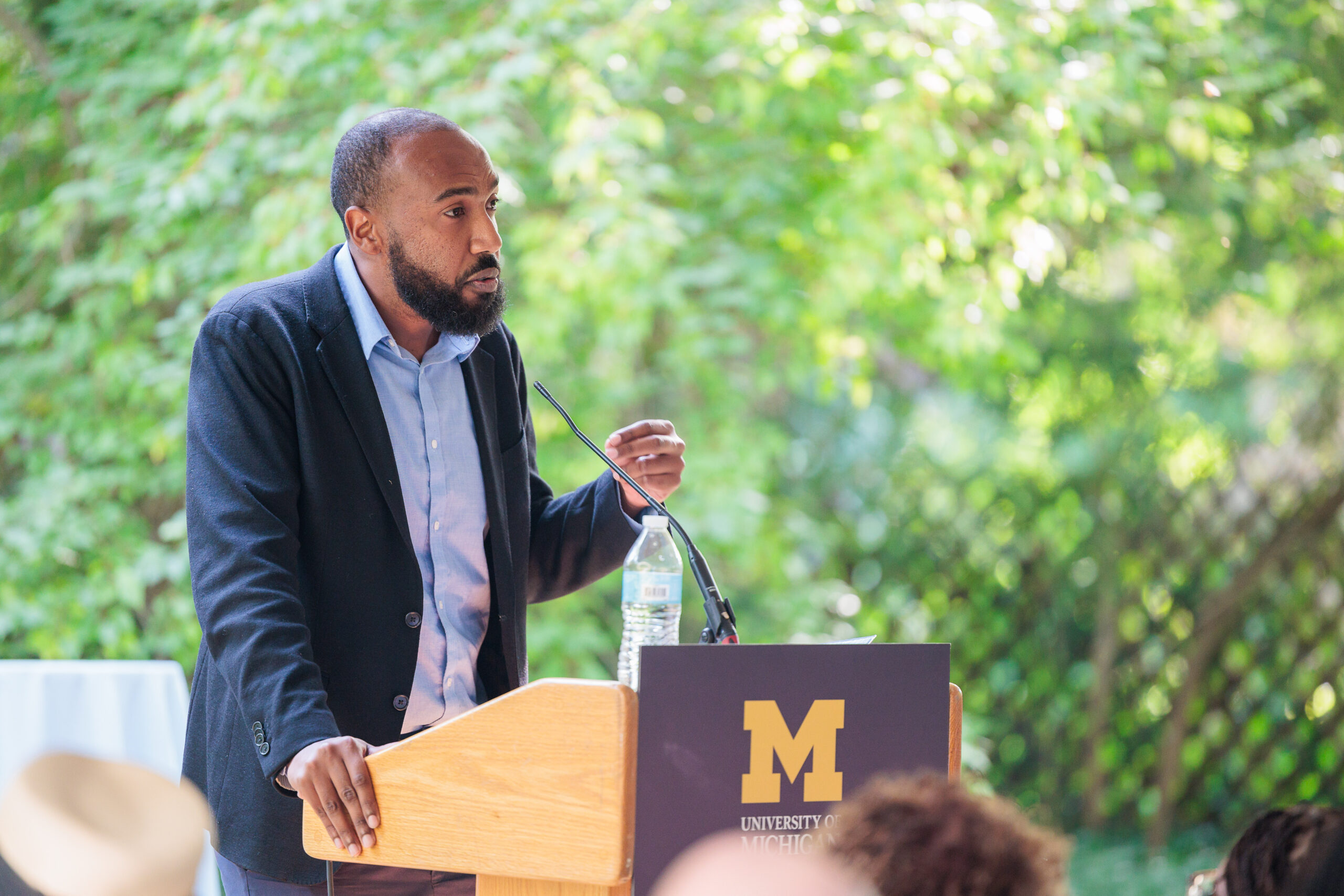Q&A with Mazin Sidahmed of Documented
Mazin Sidahmed is co-executive director of Documented, an independent, non-profit newsroom dedicated to reporting with and for immigrant communities in New York City. He was a 2021 Knight-Wallace Reporting Fellow during the Covid-19 pandemic. Sidahmed returned to Wallace House in September to deliver the 37th annual Graham Hovey Lecture. Before the event, he spoke with Lynette Clemetson, director of Wallace House, about starting Documented.
Clemetson: You describe Documented as a community-driven news organization. What’s the difference between community-driven news and local news?
Sidahmed: When you’re community-driven, you’re
thinking about what kind of news and information will serve your local community best. How can we be good neighbors and actually make this a better place for all of us to live? To accomplish that, we have to listen and ask the community what they need from us and let those needs drive our decision-making, as opposed to business incentives driving our decisions.
In a city like New York, how did you determine which communities to serve and how to reach them?
We were super naive at the start. We thought the only reason the publications we’d worked at previously weren’t reaching low-wage immigrants, or the immigrants who were at the center of the stories, was that those publications weren’t translating their stories. We thought that if we just translated, published and tweeted out our stories, everyone would find them.
And when you realized that wasn’t going to work, what did you do?
We actually went to Spanish-speaking communities in New York City — predominantly immigrant Spanish- speaking communities — and asked them: “Where do you get your news? What kind of news and information do you want? What kind of news and information would be useful to you?” That’s what led us to build our first news product, our WhatsApp news service.
And now you publish in Spanish on WhatsApp. And you also publish in Chinese on WeChat, and in Haitian Creole on Nextdoor. That’s very tailored news delivery to specific communities. How has that changed your editorial structure?
In order to get the model to where we needed it to be, we created a newsroom role called community
correspondent. It’s part reporter, part product manager, part community engagement. Our Spanish-speaking community correspondent spends about a third of his day on WhatsApp replying to people’s messages, hearing from people, trying to understand their interests, replying to their questions and
bringing those insights into editorial meetings. So if a bunch of people say they had issues with their utility bills, he’ll report a story on that.
I imagine it’s not the kind of journalism you thought you’d be doing when you started.
It took a lot of soul-searching to get to where we let the communities lead on what they wanted us to do. The things that I’ve been trained to reach for or valorize were not necessarily aligned with what the community wanted. But when we actually listened to the community, the readership went up. People read those stories. They were shared and had traction in the communities we wanted to reach.
You’ve also done some deeply meaningful investigative work, including an investigation with ProPublica that uncovered more than 13,000 wage theft cases, totaling more than $203 million in stolen wages, from more than 127,000 New York workers.
We did a listening tour, and every community group that we went to speak to wanted to talk about wage theft. That was the problem that was at the top of people’s minds. So [my co-founder] Max Siegelbaum thought, “How can we put our investigative muscle toward creating something useful to the community?”
He decided to create a database of all the companies in New York state that had been convicted of stealing wages. He thought it would be straightforward for the state to give him the names of the companies. It ended up being a four-year lawsuit against the New York State Department of Labor. Our stories led to legislation introduced in the New York State Legislature that uses our database to set guidelines for how wage theft should be prosecuted. So that’s an example of how you go from listening to a community to powerful investigative journalism.
You applied for and received the fellowship during the Covid-19 pandemic. How did the fellowship help you move forward with your work?
I was at that stage that most founders get to when they realize they really need to focus on the business and operation side. There’s this dream, you know, that you’ll hire a person so you can do the fun stuff you always dreamed of doing. You’ll hire someone to be the adult in the room and take care of the business and the operations. But you quickly realize that no one can speak as authentically to your work as you can, and you can’t give up those decisions to an outside party. It became clear to me — maybe even a year before I started the fellowship — that I should take on that role. But I was in denial because it felt like the end of my journalism career, and I wasn’t ready to do that yet.

Did the need to focus on the business side of Documented lead to an identity crisis?
Yeah. I was having an identity crisis that year going into the fellowship. Having that space and time and the community of other Fellows to talk through what this might mean for me, to reflect on it and hear from other people who have gone through similar journeys and transformations helped me. And a lot of my long conversations with you. It made me come to terms with the fact that it’s what Documented needed. And it’s something I’m good at, and that’s okay.
What advice would you give to someone thinking about starting a community-focused news organization in Ohio, Indiana, or somewhere very removed from the networks and resources in New York?
Start by fully understanding the problem that you’re trying to solve. If you have an inherent feeling of what your community needs, go out, make a case and try to prove it. Find somebody who has a skill set different from yours, someone who complements you in some way, and build together. Then, find a community of other folks who are doing a similar thing. Building community with other leaders around the country will help you get through the hard times. Always keep your North Star, and keep in touch with the people who will be impacted by your work.
Mazin Sidahmed is a 2020 Knight-Wallace Fellow.
This interview appeared in the Fall 2024 issue of the Wallace House Journal.

